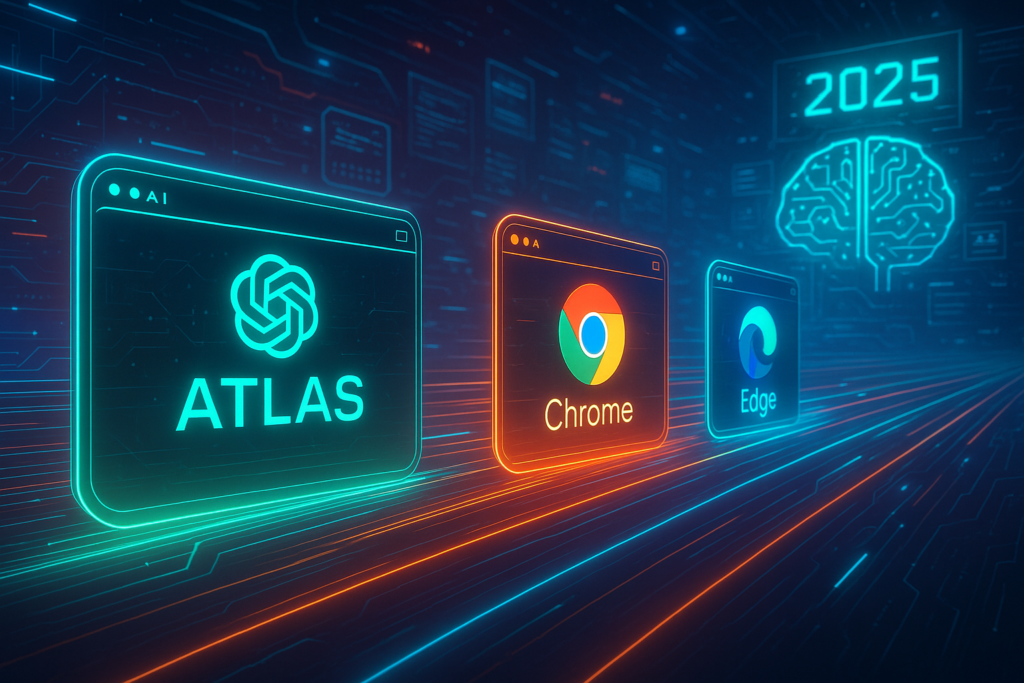Introduction
The way we browse the internet is changing faster than ever. In 2025, artificial intelligence (AI) has officially entered the browser wars. With OpenAI’s ChatGPT Atlas, Google Chrome, and Microsoft Edge all competing to redefine how people search, work, and interact online, he browser is no longer just a window to the web. It’s becoming your personal assistant. In this post, we’ll explore why the AI browser race matters, how ChatGPT Atlas is challenging the old giants, and what this means for the future of online experiences.
1. The Rise of AI Browsers
Until recently, browsers were simple tools, you typed, searched, and clicked. But the explosion of AI chatbots and agents has completely shifted expectations.
AI browsers are designed to understand context, answer questions conversationally, and even perform tasks automatically. Instead of searching through 10 links, users now get direct answers, summaries, and actions, all powered by AI.
This evolution marks the beginning of a new search era, where browsing is not about finding information, it’s about getting results instantly.
2. OpenAI’s ChatGPT Atlas: The New Challenger
OpenAI’s newly launched ChatGPT Atlas browser is shaking things up. Built with the ChatGPT interface at its core, Atlas aims to replace traditional search engines with conversational browsing.
Key Features of ChatGPT Atlas:
- Chat with your search results, no more manual copy-paste or tab switching.
- Sidecar assistant that understands the context of your screen.
- Agent Mode to automate small tasks in the browser.
- Personalized browsing history, where ChatGPT learns from your habits.
Atlas is currently available on macOS, with Windows, iOS, and Android versions on the way. What makes it revolutionary is that it’s built not just for searching, but for thinking and acting like a digital assistant.
3. Google Chrome: Fighting to Stay on Top
With over 3 billion users, Google Chrome has dominated the browser market for years. But AI has disrupted that dominance.
Google is now embedding Gemini AI features inside Chrome, offering smart summaries, contextual search, and voice-based queries. However, Chrome’s challenge lies in balancing legacy performance with AI innovation.
The real question: can Chrome keep up with tools like ChatGPT Atlas that are built around AI from day one?
4. Microsoft Edge: The Early Adopter
Microsoft Edge was one of the first browsers to integrate AI deeply, powered by Copilot and Bing Chat. It offers a clean experience with contextual chat on any webpage and AI-driven writing or summarizing tools.
However, Edge struggles with user perception, it’s seen as the “default Windows browser,” not a trend-setter. Despite strong features, it still lags in popularity compared to Chrome and upcoming AI-first browsers like Atlas.
5. Why the AI Browser Race Matters
The competition between Atlas, Chrome, and Edge isn’t just about who gets the most downloads. It’s about who controls the next generation of web search.
Here’s why it matters:
- 🔍 Search behavior is changing — Users now expect answers, not links.
- ⚙️ Automation is the new browsing — Browsers that can act will win.
- 🧠 Personalization — AI will tailor every browsing session uniquely.
- 🔐 Privacy trade-offs — The more your browser knows, the more it can help, but at what cost?
This race will decide not just how we browse, but how we interact with the entire internet.
6. The Future: Beyond Browsing
In the near future, AI browsers could evolve into complete digital environments, handling scheduling, research, and content creation without needing separate apps.
Imagine searching for “create a marketing report”, and your browser automatically gathers sources, analyzes data, and builds a draft for you. That’s not science fiction anymore, ChatGPT Atlas is the first step in that direction.
Conclusion
The AI browser race of 2025 is reshaping the internet landscape. While Google Chrome and Microsoft Edge fight to integrate AI, OpenAI’s ChatGPT Atlas is redefining what browsing even means.
Whether Atlas dethrones Chrome or not, one thing is clear:
The future of search isn’t about typing, it’s about talking, understanding, and acting.
As we move deeper into the age of AI-powered browsing, users, developers, and marketers will all need to adapt to this intelligent, conversational web.
